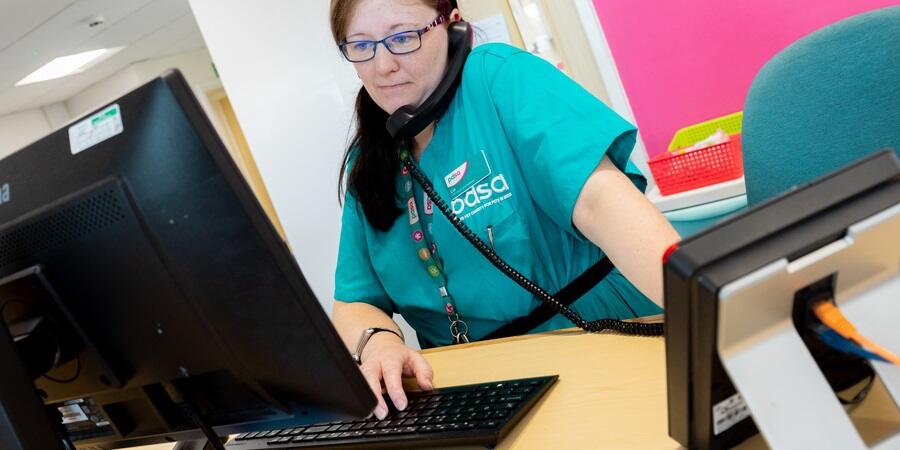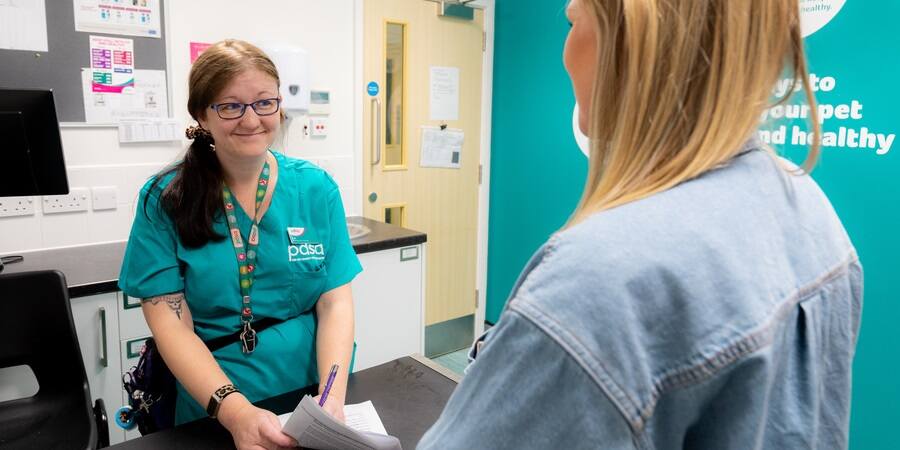Can you describe a typical day at work?
Each day is different at PDSA - with the odd emergency or two thrown into the mix. My role as a Veterinary Care Assistant (VCA) is incredibly important, assisting with many aspects of patient care and helping to ensure the smooth running of the Pet Hospital.
Caring for pets
A massive part of my job is to care for and aid poorly pets who are recovering or receiving treatment. My tasks can include:
- Providing food and water for poorly pets, and walking the dogs that are staying in with us.
- Giving reassurance to pets that are frightened.
- Checking and monitoring pets while they’re resting or recovering.
- Making up kennels with items so that pet patients are comfortable during their stay with us.
- Grooming patients to maintain good hygiene, helping to make them feel better.
- Dispensing medication and making sure that owners are comfortable with how to give that medication to their pet.
Ensuring cleanliness and safety of pet patients
Cleanliness and safety at PDSA are essential for maintaining the health and well-being of animals, creating a secure and welcoming environment for pet patients and staff. Ensuring this is a huge part of my job as a VCA and my tasks can include:
- Setting up the preparation area and theatre for the Vets and Vet Nurses before surgery.
- Making sure all the equipment is ready such as the oxygen is connected and working correctly.
- Cleaning all the equipment before and after surgery (including the surgical instruments).
- Washing bedding to ensure pets have clean blankets.
Crucial admin tasks
VCAs support in the efficient running of the hospital. Many other tasks that I do in my job include:
- Helping to admit patients for surgery, and speaking with their owner’s about their needs and preferences to ensure a comfortable stay.
- Supporting on reception or night shifts.
- Accepting donations from the public such as towels, newspapers and pet food.

What made you apply for the VCA role at PDSA?
Before applying, I was studying to be a Veterinary Nurse. In 2016, I came off the Veterinary Nurse course due to my mental health, and was later diagnosed with autism and ADHD. I took a few years out to focus on my mental health and then applied to be a Veterinary Care Assistant here at PDSA, and I’ve never looked back.
I am passionate about working within the veterinary sector and I think it’s amazing that PDSA uses charitable funds to help people and their pets. I like the idea that we are helping people in need in order to keep pets and families together.
What’s more, I’ve found PDSA a very enjoyable and supportive place to work. So I’ve been able to carry out my dreams of working with animals in the veterinary sector.
What would you say is your favourite thing about being a VCA?
One of my favourite things is helping with the treatment and recovery of pets. It’s such a fantastic feeling when you are handing a pet who has made a full recovery back to their owner and seeing the owner’s relief that their pet is better.
What are some of the most common cases that you see?
Unfortunately, at PDSA we see a lot of dogs with pyometra. Female dogs develop this life-threatening infection of the womb if they aren’t neutered. Therefore, we highly recommend getting pets neutered to avoid this from happening.
Another common case we see is parvovirus infection. This virus affects both vaccinated and unvaccinated dogs, causing severe vomiting and diarrhoea and sadly can be fatal to them. We recommend vaccinating them against parvovirus and other diseases to keep them protected, as it’s less common and generally less severe in vaccinated dogs.
What’s the most interesting or unusual case that you’ve seen?
Recently, we had a cat come in with a fishhook stuck in their paw – it was quite a large fishhook and a deep injury. The Vet put her under general anaesthetic and carefully took the fishhook out. Thankfully, the pet made a full recovery and went back home to their very relieved owner.

Do you have any pets?
I have Luna the cat, Megan and Charlie the cockatiels, and even more pets at home! As you can probably tell, I love animals.
If someone was thinking of donating to PDSA, what would you say?
There is currently the cost of living crisis affecting many households with pets. People are struggling to pay for treatment and medication. If their pet does have an unfortunate illness, some owners are struggling to find the finances to get their much-loved pet’s treatment.
Thankfully, PDSA supports those families by treating their animals. We are keeping many families together as we use our charitable funds from our generous supporters to help those owners and pets in need. The animals can then make a full recovery meaning the owners and pets stay together.
